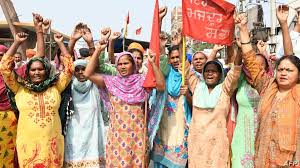In India, International Women's Day has been marked by sit-ins and hunger strikes led by female farmers against the country's new agricultural laws. Local media reported that at least 40,000 women traveled to New Delhi this International Women's Day to take part in the protests. Throughout the country, women have played a leading role in the months-long protests. While Prime Minister Narendra Modi says the laws are an effort to modernize agriculture, for months now, they've been met with protests involving hundreds of thousands of farmers throughout the country. Farmers allege the new laws passed by the Indian Parliament in September would allow big companies to drive down crop prices. In response to backlash, the Modi administration proposed an 18-month hold on the laws. Farmers, however, said they will not settle for anything less than a full repeal. Agriculture makes up about 15 percent of India's economy. It's also the primary source of livelihood for nearly 60 percent of the country's population.

Lebanese protesters blocked key roads with burning barricades in rage at the country's political paralysis and deep economic crisis on Monday after its currency hit record lows on the black market. The country is in the grips of its worst economic crisis in decades, compounded by the coronavirus pandemic. Prices have soared and more than half of the population is living below the poverty line, but the divided political class has been unable to form a cabinet for the past six months. Lebanon's currency has lost more than 80 percent of its value since the autumn of 2019, plunging to an all-time low of nearly 11,000 pounds to the dollar. More on this and all the stories we're covering is available at our website voanews.com. Via remote, I'm Marissa Melton, VOA news.
VOA译文由可可原创,未经许可请勿转载。











